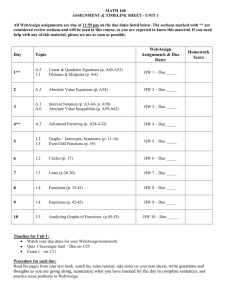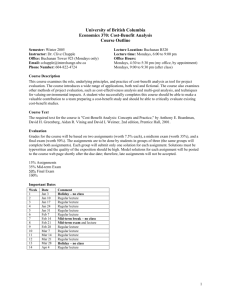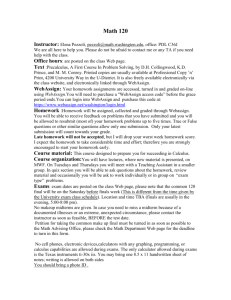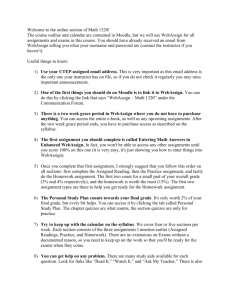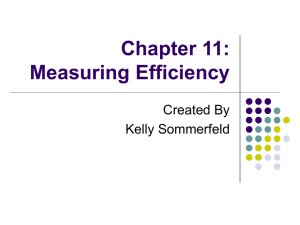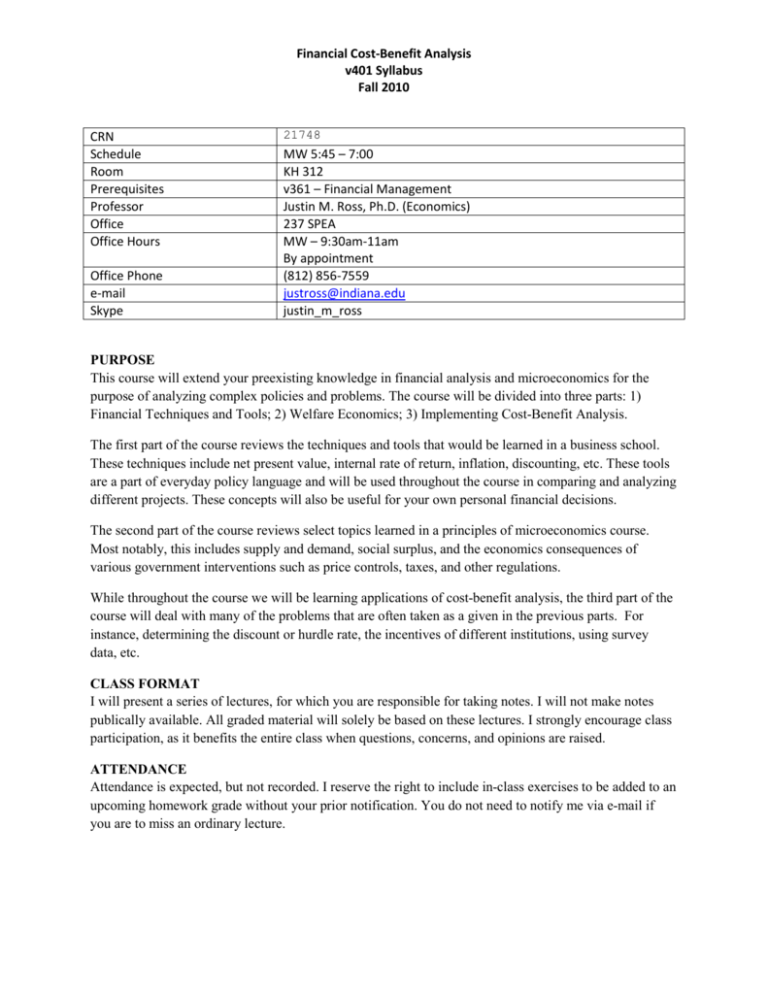
Financial Cost-Benefit Analysis
v401 Syllabus
Fall 2010
CRN
Schedule
Room
Prerequisites
Professor
Office
Office Hours
Office Phone
e-mail
Skype
21748
MW 5:45 – 7:00
KH 312
v361 – Financial Management
Justin M. Ross, Ph.D. (Economics)
237 SPEA
MW – 9:30am-11am
By appointment
(812) 856-7559
justross@indiana.edu
justin_m_ross
PURPOSE
This course will extend your preexisting knowledge in financial analysis and microeconomics for the
purpose of analyzing complex policies and problems. The course will be divided into three parts: 1)
Financial Techniques and Tools; 2) Welfare Economics; 3) Implementing Cost-Benefit Analysis.
The first part of the course reviews the techniques and tools that would be learned in a business school.
These techniques include net present value, internal rate of return, inflation, discounting, etc. These tools
are a part of everyday policy language and will be used throughout the course in comparing and analyzing
different projects. These concepts will also be useful for your own personal financial decisions.
The second part of the course reviews select topics learned in a principles of microeconomics course.
Most notably, this includes supply and demand, social surplus, and the economics consequences of
various government interventions such as price controls, taxes, and other regulations.
While throughout the course we will be learning applications of cost-benefit analysis, the third part of the
course will deal with many of the problems that are often taken as a given in the previous parts. For
instance, determining the discount or hurdle rate, the incentives of different institutions, using survey
data, etc.
CLASS FORMAT
I will present a series of lectures, for which you are responsible for taking notes. I will not make notes
publically available. All graded material will solely be based on these lectures. I strongly encourage class
participation, as it benefits the entire class when questions, concerns, and opinions are raised.
ATTENDANCE
Attendance is expected, but not recorded. I reserve the right to include in-class exercises to be added to an
upcoming homework grade without your prior notification. You do not need to notify me via e-mail if
you are to miss an ordinary lecture.
Financial Cost-Benefit Analysis
v401 Syllabus
Fall 2010
REQUIRED MATERIAL
WebAssign.net: At the end of the first week, I will upload a class roster for your enrollment. You will
then be responsible for completing further instructions regarding your registration.
RECOMMENDED MATERIAL
Cost-Benefit Analysis: Concepts and Practice 3rd Edition, by Boardman, Greenberg, Vining, and Weimer.
Pearson Prentice Hall, 2006.
It is entirely feasible for you to pass the class without this textbook. In fact, the book is only of minimal
help on the first part of the course, but will be much more helpful on the latter two parts. This is because
most cost-benefit analysis textbooks are written with business students as the intended audience who have
been required to tak financial analysis techniques in other courses. No graded material will require you to
have the textbook to complete.
COURSE POINTS
Your final grade in the course will be determined by the following:
Item
Homework 1
Homework 2
Homework 3
Homework 4
Case Study
Exam 1
Exam 2
Exam 3
Tentative Description
Intro to WebAssign, questions based on syllabus
Techniques in Financial Analysis
Concepts in Welfare Analysis
Implementing Cost-Benefit Analysis
Details T.B.A.
Financial Analysis
Welfare Analysis
Cost-Benefit Analysis
Sum Total:
% of Final Grade
1%
8%
8%
8%
10%
23%
23%
23%
104%
GRADE DETERMINATION
Grades are assigned strictly on merit, never on the basis of need. Merit is determined by the results of the
graded material, in which effort is not included. A reoccurring theme in class will be that your effort will
not matter, only the results. This is the nature of the kind of work you will be performing with these tools,
it is essential for your career success that you get the answers correct.
Final Grade Range*
>= 97%
97% > x >= 94%
94%> x >= 90%
90%> x > 87%
87%> x >= 84%
84%> x >= 80%
80%> x > 77%
77%> x >= 74%
74%> x >= 70%
70%> x >= 67%
Letter Grade
A+
A
AB+
B
BC+
C
CD+
Financial Cost-Benefit Analysis
v401 Syllabus
Fall 2010
67%> x >= 64%
D
64%> x >= 60%
D60%> x
F
*No Rounding will be employed
MAKE-UP OR MISSED MATERIAL
There are no make-up exams and late assignments are not accepted. Job interviews are not an excuse for
missed assignments, classes, or tests. You must schedule your job search around the class assignments.
You may be excused from an assignment or exam only in cases of illness or family emergency. Family
vacations do not constitute an emergency. If you must miss an assignment or test due to illness, you must
notify me immediately and provide a note from a doctor written on letterhead with the doctor’s name,
signature and telephone number. This is the only way you can make up a missed assignment due to
illness. If you miss an assignment or test due to a family emergency, you must notify me before the
assignment or test. In addition, you must provide a written explanation of the nature of the emergency,
the dates on which you were away from school, where you stayed during those dates, the telephone
number of the person with whom you stayed, and the name and telephone number of the officiating party
(funeral director, minister, rabbi, etc. in the case of a death, the name of the treating doctor in the case of a
family member’s serious illness). I understand that providing this information may be a burden on you at
a particularly difficult and sensitive time. Unfortunately, we have found that assignments and particularly
tests have led to inexplicable epidemics of illnesses and family deaths. There have even been almost
scholarly papers written on the topic.
SPECIAL ARRANGEMENTS
If you require special arrangements for the exams, especially extended time due to a learning disorder,
notify me at least two weeks in advance of the first exam, providing documentation of the condition or
circumstances that would justify the special arrangements.
ACADEMIC MISCONDUCT
I will not tolerate academic misconduct. This includes collaboration on the homework, exams, or case
study. The Indiana University Code of Student Rights, Responsibilities and Conduct, Section III A
discusses student academic misconduct. You can find this information on the website at
http://dsa.indiana.edu/Code/index1.html. Any student found cheating or engaging in any form of
academic dishonesty will receive a failing grade for the course and will be reported to the Dean of Student
Affairs. Other sanctions are possible.
Academic misconduct includes, but is not limited to, cheating on exams or quizzes, copying or
collaborating on the case studies, and misrepresenting information related to missed exams or
assignments.
Financial Cost-Benefit Analysis
v401 Syllabus
Fall 2010
SIGNIFICANT DATES
Event
Homework 1 Due (Webassign.net)
Homework 2 Due (Webassign.net)
Exam 1
No Class
Homework 3 Due (Webassign.net)
Exam 2
Case Study Memo Due
No Class (Thanksgiving Break)
Homework 4 Due (Webassign.net)
Saturday, December 11
Final Exam
Date/Time
Wednesday, September 7 @ 9:00 p.m.
Sunday, September 26 @ 9:00 p.m.
Wednesday, September 29
Wednesday, October 6
Sunday, October 17 @ 9:00 p.m.
Wednesday, October 20
Wednesday, November 10 @ Class Beginning
Wednesday, November 23
Tuesday, December 7 @ 9:00 p.m.
Last Day of Classes
Thursday, May 7 @ 2:45-4:45 p.m.

